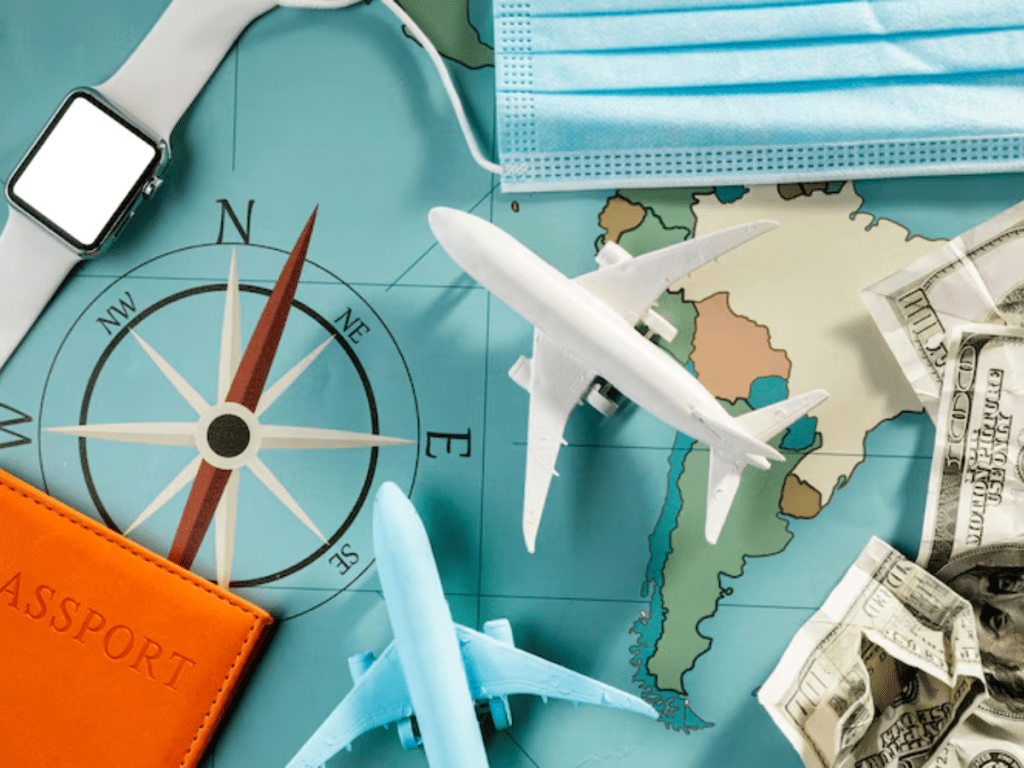Introduction
The COVID-19 pandemic transformed people’s perspective regarding travel and travel insurance. Previously, it was an additional but optional package. Now, however, travel insurance is a necessary part of trip planning. The unpredictability of health issues, safety laws, border restrictions, and unplanned cancellations have raised the risk for the traveler. Due to this reason, it becomes necessary to learn about how the COVID-19 affects travel insurance.
As travel becomes available internationally and domestically, many tourists are wondering if their travel insurance policy covers COVID-19 event-related claims. And the response is not always a simple one, as coverage is provider-specific, policy-specific, and add-on purchase-based. To prevent misunderstanding, it’s crucial to know what is typically covered under COVID-19 and what is usually not.
How Travel Insurance Coverage Has Evolved Since the Pandemic
Prior to the pandemic, most travel insurance policies simply covered typical interruptions like delayed flights, lost bags, and emergency medical costs. Few policies considered a global health crisis like COVID-19. As the virus began spreading exponentially, insurance companies struggled to modify their policies to meet the changing requirements of travelers. Numerous travelers were unable to recoup the cost of canceled trips as a result of the absence of pandemic coverage.
To address these issues, insurance companies started revising their policies to provide more detailed and extensive coverage regarding COVID-19. Now, travelers can purchase policies that cover COVID-19, but the conditions remain quite different among insurers. This makes it essential for travelers to carefully read the policy documents before purchasing.
COVID-19 Coverage in Modern Travel Insurance Plans
Most contemporary travel insurance policies now provide some kind of protection for COVID-19 related events. But not all policies are created equal. Knowing the various kinds of coverage will enable you to select the right policy for your particular travel plans.
Coverage for Trip Cancellations Due to COVID-19
One of the most significant features of COVID-19 travel insurance is trip cancellation coverage. In case you receive a positive COVID-19 test result prior to your departure date and are not recommended to travel by a healthcare professional, most travel insurance plans will cover non-refundable trip expenses. Such expenses could be flights, hotel bookings, and pre-paid tours. This type of coverage is particularly crucial for international travel or costly travel packages.
It is worth mentioning that documentation will be needed. You will probably need to present a positive COVID-19 test and a doctor’s note recommending against travel. Without proper documentation, your claim will be denied.
Medical Treatment Coverage While Traveling
Another important aspect of COVID-19 coverage is medical care. In case you fall ill with the virus while traveling and require medical care, a good travel policy will pay for the treatment. This encompasses visits to the doctor, hospitalization, medication, and even sometimes mental health services if required.
This protection is particularly crucial when visiting nations where medical care is expensive. Without insurance, you might have to pay cash for medical care, which can easily turn into a cost that is difficult to bear. Always check to ensure that your insurance company provides adequate medical coverage to your destination.
Trip Interruption and Early Return
If you are already on your trip and need to cut your trip short due to contracting COVID-19 or a travel companion contracting COVID-19, trip interruption coverage can assist. This benefit pays you for unused, non-refundable segments of your trip, including remaining hotel stays or activity charges. Some policies also pay for additional travel costs incurred due to the early return, including booking a new flight home.
Trip interruption coverage offers reassurance when in groups or traveling with family members. In the event of illness among one person, the whole group might be forced to come back early, which is a key component of end-to-end COVID-19 travel insurance.
Quarantine Expenses and Extended Stay
Quarantine is demanded in many countries from travelers in case they show a positive report of COVID-19. They are forced into additional hotel bills, food expenses, and more costs of travel for longer times. Some companies in the industry now provide protection for quarantine where such costs get reimbursed depending on the boundaries of your cover.
This benefit is particularly useful for tourists traveling to nations with compulsory government-monitored quarantine schemes. Yet, coverage amounts and covered expenses differ, so it is best to review the policy for specifics prior to counting on it.
Emergency Evacuation and Repatriation
In extreme cases, travelers who develop COVID-19 while abroad can need emergency evacuation for medical reasons. This may mean transportation to a nearby hospital with suitable facilities or even repatriation to your home country for expert care. Emergency evacuation is usually one of the costliest aspects of medical travel insurance, and it is not covered by all policies.
Prior to traveling, ensure your policy includes emergency medical evacuation and verify the maximum benefit limit. Some providers may necessitate prior authorization or coordination via a third-party service, so have those contact numbers handy while traveling.
Common Exclusions Related to COVID-19
Although numerous insurers now provide coverage for COVID-19, there are still some exclusions that apply. Knowing what is excluded can avoid disappointment and financial loss.
Travel Restrictions and Border Closures
Most travel insurance policies do not cover costs incurred due to government-imposed travel restrictions or closure of borders. If the country you are visiting suddenly closes its borders and you cannot travel, you are not usually entitled to a refund by your insurance company. You have to depend on the goodwill of your airline or travel company for rescheduling or refunds.
Cancellation Due to Fear of Infection
Canceling a trip due to concern or fear of getting COVID-19 is typically not an acceptable reason for refund. Regular insurance policies do not cover this situation. If you desire the ability to cancel for any personal reason, you might consider buying a cancel for any reason add-on. More costly, this allows for more general cancellation options but still might not refund the entire cost of your trip.
Insufficiency of Entry Requirements
Several nations demand documentation of vaccination, negative test results, or adherence to quarantine as a requirement of entry. If you do not comply with these requirements and are refused boarding or entry, your insurance most likely will not cover any consequential losses. It is up to you to remain advised about present entry regulations and have all required documents in order ahead of time.
Pre-existing Condition Complications
COVID-19 could be more dangerous for people with pre-existing conditions. Sadly, most insurance plans do not cover COVID-19 complications if they are caused by a known medical condition. There are some insurers that provide plans with coverage for pre-existing conditions, but you will typically need to reveal your medical history and possibly pay an additional premium for this coverage.
Tips for Selecting the Best COVID-19 Travel Insurance Policy
With so many choices, choosing the best travel insurance policy can be daunting. Here are some important tips to guide you in making an informed choice.
Assess Your Travel Requirements
Think about the nature of your travel and possible threats. Are you traveling abroad or within your home country Are you on group tours or independent travel Is your destination famous for harsh quarantine regulations Based on your knowledge of your traveling profile, you can select an insurance policy that suits your precise requirements.
Compare Multiple Providers
Do not just accept the initial insurance policy that you find. Compare products of various providers and determine variations in coverage, expense, and procedure for filing a claim. Use good comparison sites and review pages to collect customer feedback from fellow travelers.
Read Policy Details Thoroughly
Take the time to read the full policy, including sections on exclusions, coverage limits, and claim procedures. Pay attention to any clauses related to COVID-19 and pandemic coverage. If anything is unclear, reach out to the insurance provider for clarification before purchasing the plan.
Consider Add-on Coverage Options
There are occasions where there can be additional protection needed, i.e., for cancel for any reason policies or for extended quarantine cover. Even though these raise the overall expense, they give more flexibility as well as calm in times of uncertainty.
Know How to File a Claim
Have a duplicate of your insurance policy, phone numbers, and any supporting documentation with you when traveling. If you test positive or are involved in a covered event, keep all documentation such as receipts, medical reports, and official test results. Adhere to the claims process verbatim as set forth by your insurance company to avoid delays or denials.
What to Do If You Test Positive While Abroad
Being tested positive for COVID-19 during travel can be a stressful situation. Having a plan can help you handle the situation more composed.
Isolate right away and adhere to local health authority regulations
Notify your insurer as soon as possible
Seek medical care if symptoms persist and retain all records of treatment
Inform your accommodation provider to stay longer if necessary
Notify your airline of your circumstance and talk to them about rescheduling your return
Being aware and prepared can make a difficult circumstance a manageable one.
Final Thoughts
As travel continues to evolve in response to global health challenges, travel insurance is more important than ever. It provides crucial protection against unforeseen events such as illness, cancellations, and emergencies that may arise during your trip. While many insurance providers now include COVID-19 related coverage, the level of protection varies widely.
Prior to making any travel arrangements, spend some time comparing and researching various insurance policies. Make sure your policy includes important aspects like trip cancellation, medical care, quarantine expenses, and emergency evacuation. Reading the fine print and knowing what you’re covered for will enable you to travel with more confidence and less anxiety.
With the appropriate travel insurance policy, you can have your trip while you are assured that you are covered against the unexpected hurdles that may come your way in the post-pandemic environment.

